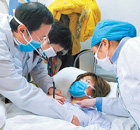Alexis Hooi
Keeping a Chinese tradition safe and alive
By Alexis Hooi (China Daily)
Updated: 2009-12-11 07:53
When I saw fireworks for the first time in Beijing, the sights and sounds on the streets of the capital blew me away.
Coming from a tropical country where celebratory pyrotechnics are limited to strictly controlled public displays or handheld sparklers, the experience of fireworks and firecrackers just around the corner of any neighborhood involves a primal attraction to heat and light that help dispel cold, wintry nights.
So when news of the latest mishap in China involving fireworks broke over the weekend, I found myself once again torn between supporting the Chinese tradition and calling for a ban on it.
On Saturday, a truck carrying 5 tons of gunpowder for making fireworks blew up on the Beijing-Zhuhai expressway in Hubei province. The blast killed four people on the spot, left a hole more than 100 sq m large at the center and cracks of up to 70 cm wide on the surface of the nearby road.
The explosion also damaged more than 300 houses in 10 nearby villages and injured at least 29 villagers, local officials said. Investigations are ongoing, but police suspect the gunpowder ignited because the material can start to burn spontaneously if it is not kept dry.
Death and damage resulting from fireworks is not uncommon in the country.
Just last month, three people died and four others were injured from a blast at a fireworks factory in Gaozuo town of Jiangsu province.
At the same time, 11 children and an elderly resident in Hezhou in the Guangxi Zhuang autonomous region were seriously burned after an explosion at an illegal fireworks workshop.
In one of the most infamous mishaps in Beijing involving fireworks yet, a building in the newly built headquarters of State broadcaster CCTV was gutted after pyrotechnicians were reportedly hired to set off hundreds of illegal fireworks above the construction site during the last Spring Festival holidays.
The charred, skeletal remains of the building in the city's central business district stand as a grim reminder of the dangers of fireworks that get out of control.
Reports of illegal fireworks production and storage continue to abound, and I shudder to think of the perils posed by the setting off of pyrotechnics in the capital alone with the next Spring Festival this coming February in the Chinese Year of the Tiger.
Still, the authorities have understandably recognized the need to continue a tradition many Chinese hold close to their hearts. Beijing placed a total ban on fireworks in urban areas in 1993 because of environmental and safety concerns but had to amend the regulation more than a decade later because of public pressure, allowing residents to indulge in the practice at designated locations and within specific periods.
The municipal government allows such fireworks during Spring Festival for the entire city. Residents within the Fifth Ring Road are permitted to set off firecrackers from 7 am to midnight in the following days before the 15th day of Spring Festival.
But walk around the city during the festivities and you will most certainly come across the designated stalls that sell costly fireworks for Beijingers to set off, on streets that seem precariously close to buildings in an increasingly built-up metropolis.
While I must admit to enjoying the many fireworks that are provided by groups and individuals during the holidays, these obviously pale in comparison to the mass displays seen during major celebrations such as National Day and the Beijing Olympics.
Why spend your own money on pyrotechnics when the same can be enjoyed on a much grander scale that is provided for by the State to match the impressive and exhilarating displays in other global cities like Boston's Fourth of July celebrations along the Charles River or Tokyo's Summer Festival on the banks of the Sumidagawa?
With Beijing getting more saturated with buildings and public facilities, authorities might also want to take fireworks off the streets completely and limit them to parks and open spaces that can be more easily controlled for fire hazards to satisfy the die-hard fireworks fan - so that a tradition can be kept safe and alive.
E-mail: alexishooi@chinadaily.com.cn
(China Daily 12/11/2009 page8)









